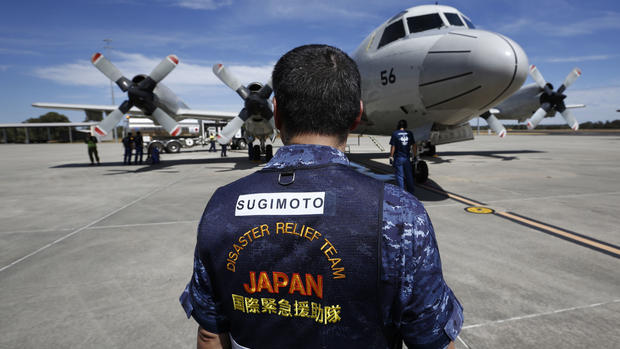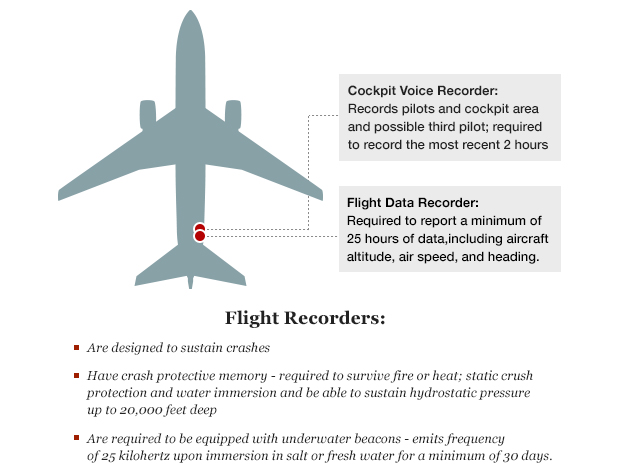Malaysia Airlines Flight 370: Drama as underwater search for "black boxes" begins
PERTH, Australia -- Crews searching for the missing Malaysia Airlines jet launched a targeted underwater hunt on Friday for the plane's black boxes along a stretch of remote ocean, with just days left before the devices' batteries are expected to run out.
The Australian navy ship Ocean Shield, which is dragging a towed pinger locator from the U.S. Navy, and the British navy's HMS Echo, which has underwater search gear on board, will converge along a 150-mile track in a desolate patch of the southern Indian Ocean, said Angus Houston, the head of a joint agency coordinating the search.
Houston acknowledged that the clock was ticking for search crews.
"The locater beacon will last about a month before it ceases its transmissions - so we're now getting pretty close to the time when it might expire," he said.
As many as 10 military planes, four civilian jets and nine ships were to take part in Friday's search, and the weather forecast called for favorable conditions, Australian authorities said.
Air crews and ships have been searching for weeks for the Boeing 777, but have so far found no trace of the plane.
Because the U.S. Navy's pinger locator can pick up black box signals up to a depth of 20,000 feet, it should be able to hear the devices even if they are lying in the deepest part of the search zone - about 19,000 feet below the surface. But that's only if the locator gets within range of the black boxes - a tough task, given the size of the search area and the fact the pinger locator must be dragged slowly through the water at just 1 to 5 knots, or 1 to 6 miles per hour.
Finding floating wreckage is key to narrowing the search area, as officials can then use data on ocean currents to try and backtrack to the spot where the Boeing 777 entered the water - and where the coveted data recorders may be. Those devices would provide crucial information about what condition the plane was flying under and any communications or sounds in the cockpit.
Despite the weeks of fruitless searching, Houston said he hadn't given up hope something would be found.
"I think there's still a great possibility of finding something on the surface," he said. "There's lots of things in aircraft that float."
Fourteen planes and nine ships were taking part in Friday's hunt across an 84,000 square mile expanse of ocean, some 1,100 miles northwest of Perth, the Joint Agency Coordination Center overseeing the search said. Several ships also had helicopters on board.
The search area has shifted each day, as the investigative team continues to analyze what little radar and satellite data is available while factoring in where any debris may have drifted due to ocean currents and weather.
"I think we've probably got to the end of the process of analysis," Houston said. "And my expectation is that we're into a situation where the data we've got is the data we've got and we'll proceed on the basis of that."
Houston said it was unlikely that any additional pinger locators would join the search any time soon as they are in scarce supply.
Although Australia is coordinating the ocean search, the investigation into the plane's disappearance ultimately remains Malaysia's responsibility, though Australia, the U.S., Britain and China have all agreed to be "accredited representatives" of the investigation, Houston said.
Four Australian investigators were in Kuala Lumpur to help with the investigation and ensure that information on the aircraft's likely flight path is fed back to search crews, Houston said. The two countries are still working out who will be in charge of the analysis of any wreckage and flight recorders that may be found.
On Thursday, the HMS Echo reported one alert as it searched for sonic transmissions from the missing plane's flight data recorder, but it was quickly discounted as a false alarm, the search coordination center said. False alerts can come from animals such as whales, or interference from shipping noise.
Australian Prime Minister Tony Abbott met with staff on Friday at the Australian Maritime Safety Authority, which is running the search efforts, and acknowledged officials have no idea how long the hunt would continue.
"It is probably the most difficult search that's ever been mounted," Abbott told staffers. "A large aircraft seems like something that would be easy enough to locate - but a large aircraft that all but disappeared and disappeared into inaccessible oceans is an extraordinary, extraordinary challenge that you're faced with."
Malaysian Prime Minister Najib Razak, whose government has been harshly criticized by some victims' families for giving sometimes conflicting information about the flight and for the slow pace of the investigation, vowed during a visit to Australia this week that no effort would be spared to give closure to the families of those on board.
But Sarah Bajc, the American girlfriend of passenger Philip Wood, said a briefing on Thursday for Malaysian and other non-Chinese relatives by government and military officials at a hotel near Kuala Lumpur provided no new information and that some of the families had lost faith in the Malaysian government.
"They continually contradict themselves," Bajc said on Friday of the officials. "It's impossible to trust anything they say anymore."


